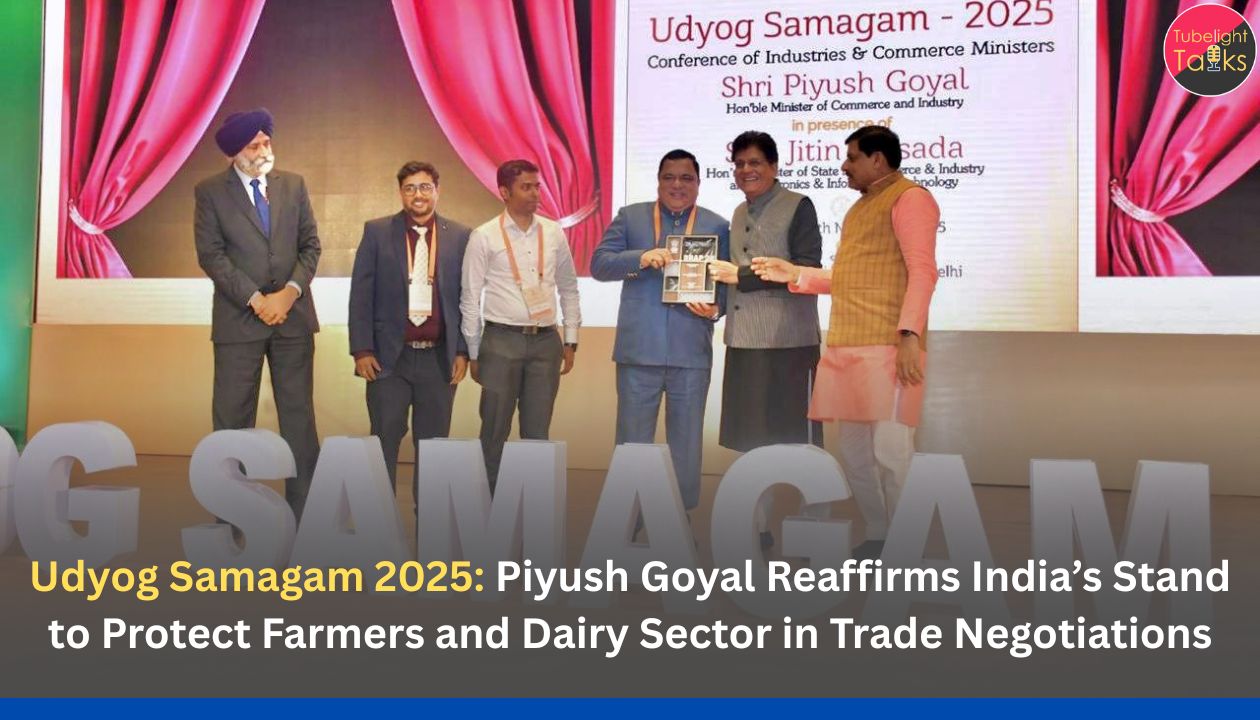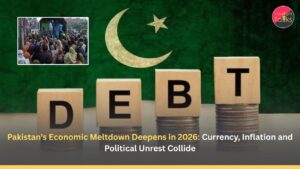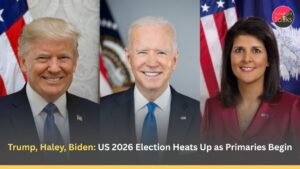Udyog Samagam 2025: Piyush Goyal Reaffirms India’s Stand to Protect Farmers and Dairy Sector in Trade Negotiations
At the heart of India’s economic diplomacy lies a firm commitment to rural India. In a landmark address at Udyog Samagam 2025, Union Commerce & Industry Minister Shri Piyush Goyal assured that India will not compromise the interests of farmers, dairy workers, and rural producers in any Free Trade Agreements (FTAs). The government will ensure that India’s trade engagements remain balanced, fair, and rooted in national interest.
Official Source: PIB India – PRID 2188992
Highlights from Udyog Samagam 2025
Held on 11 November 2025 in New Delhi, the Udyog Samagam brought together over 450 industry leaders, including many recognized as “Udyog Ratnas of Bharat”. The event aimed to align India’s manufacturing and trade sectors with the vision of Atmanirbhar Bharat.
In his keynote address, Shri Goyal reaffirmed:
“We will not sign any trade agreement that compromises the interests of our farmers, dairy workers, or small producers.”
This policy stance reflects the Centre’s long-standing position that free trade cannot come at the cost of local livelihoods, particularly in agriculture and dairy — two of India’s most sensitive and employment-intensive sectors.
Why This Statement Matters
1. Ongoing Global Trade Negotiations
India is currently in various stages of Free Trade Agreement discussions with:
- The European Union
- The United Kingdom
- Gulf Cooperation Council (GCC)
- Nations in ASEAN and Africa
These negotiations aim to improve market access for Indian goods but raise concerns about the impact on vulnerable domestic sectors.
2. The Dairy Sector: A Rural Lifeline
- India is the largest milk producer in the world.
- Home to over 80 million small dairy farmers
- Supported by strong cooperatives like Amul, Nandini, and others
Global dairy exporters have long pushed for access to India’s market, but India has resisted lowering tariffs or import restrictions, fearing a collapse in domestic prices.
India’s Balanced Trade Strategy
Shri Goyal explained that the government follows a “three-pronged strategy”:
- Expand Indian exports — especially in food processing, marine, textiles, and handicrafts
- Protect domestic livelihoods — particularly small-scale rural producers
- Ensure equitable trade — with built-in safeguards, such as:
- Sanitary and Phytosanitary (SPS) checks
- Tariff lines for sensitive products
- Phased import access, if at all
- Sanitary and Phytosanitary (SPS) checks
“We want fair and mutually beneficial agreements. But we are not desperate. National interest comes first,” the Minister stated at the event.
Stakeholder Support & Industry Reactions
Major cooperatives and farmer unions lauded the government’s stance:
- Bharatiya Kisan Union (BKU) welcomed the assurance
- Amul emphasized continued protection for dairy cooperatives
- Exporters at Udyog Samagam pledged support for the rural-first vision
According to the PIB release, industry representatives expressed satisfaction that the government is consulting stakeholders ahead of any trade policy decisions.
Building Atmanirbhar Bharat: Local Strength, Global Reach
The Udyog Samagam 2025 also focused on:
- Increasing exports to ₹75 lakh crore by 2030
- Making India a global manufacturing hub
- Promoting innovation, sustainability, and inclusive trade
“We aim for India to not just be a factory for the world, but a fair, inclusive, and self-reliant economy,” Piyush Goyal said.
Farmers Are Sacred Custodians
Trade With Compassion, Govern With Dharma
As India navigates the complex global economy, Sant Rampal Ji Maharaj offers a deeper spiritual perspective. He teaches:
“The ones who grow our food are fulfilling God’s highest command — to sustain life. Protecting them is not just economic policy, it is Dharma.”
According to Satbhakti, as taught by Sant Rampal Ji Maharaj:
- Exploiting farmers for profit reflects spiritual decline
- A society that honours its food providers will be blessed with abundance
- True governance includes material and spiritual welfare of all
He encourages everyone to:
- Support local agriculture
- Avoid food waste
- Live simply and righteously
- Take Naam Diksha and follow the path of true devotion for real prosperity
Explore teachings: JagatGuruRampalJi.org | YouTube
Time to Choose Equitable Growth
India’s Farmers Deserve More Than Promises
India’s future lies not in unchecked globalisation, but in balanced partnerships that preserve our rural ecosystem.
As citizens, we can support this vision by:
- Buying from local producers
- Backing policy that uplifts rural India
- Practicing the spiritual values that promote compassion over competition
Let’s grow, not just economically, but ethically — in line with the teachings of enlightened Saint.
Also Read: India’s Trade Position Reinforced: Goyal on Strategic Autonomy
FAQs on India’s Trade Policy & Farmers’ Protection
1. What did Piyush Goyal say about trade agreements?
He stated that India will not enter any FTA that harms the interests of farmers, dairy workers, or small rural producers.
2. Why is the dairy sector so sensitive?
India’s dairy industry supports over 80 million people and is largely unorganised. Unfair competition from imports could severely hurt livelihoods.
3. Which countries is India negotiating with currently?
Talks are ongoing with the UK, EU, GCC nations, and some ASEAN and African countries.
4. How are stakeholders involved in trade decisions?
The government is actively consulting farmer groups, cooperatives, and industry associations before finalising any trade deals.
5. Where can I read the official statement?
You can read the full PIB release here.











Discussion (0)